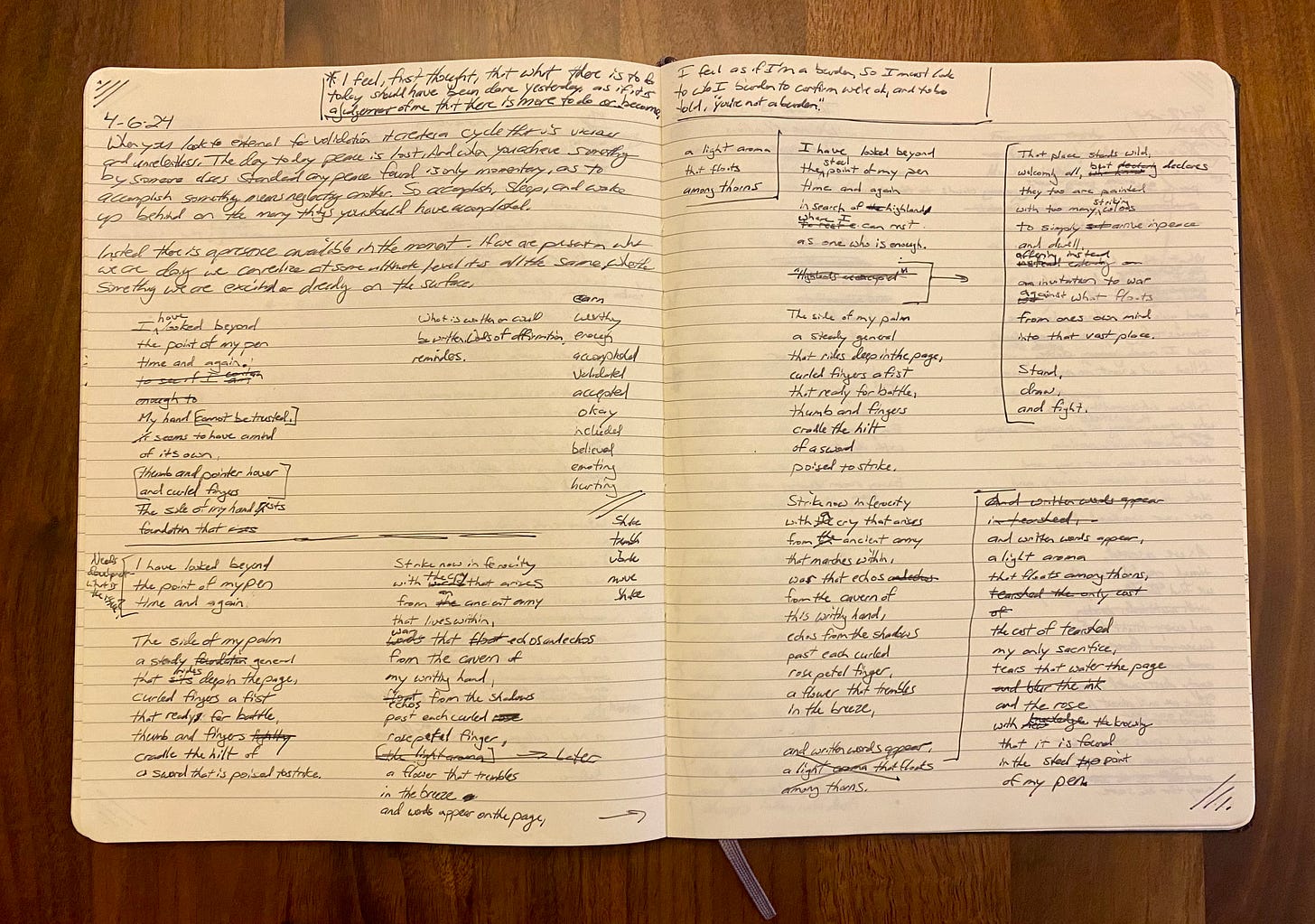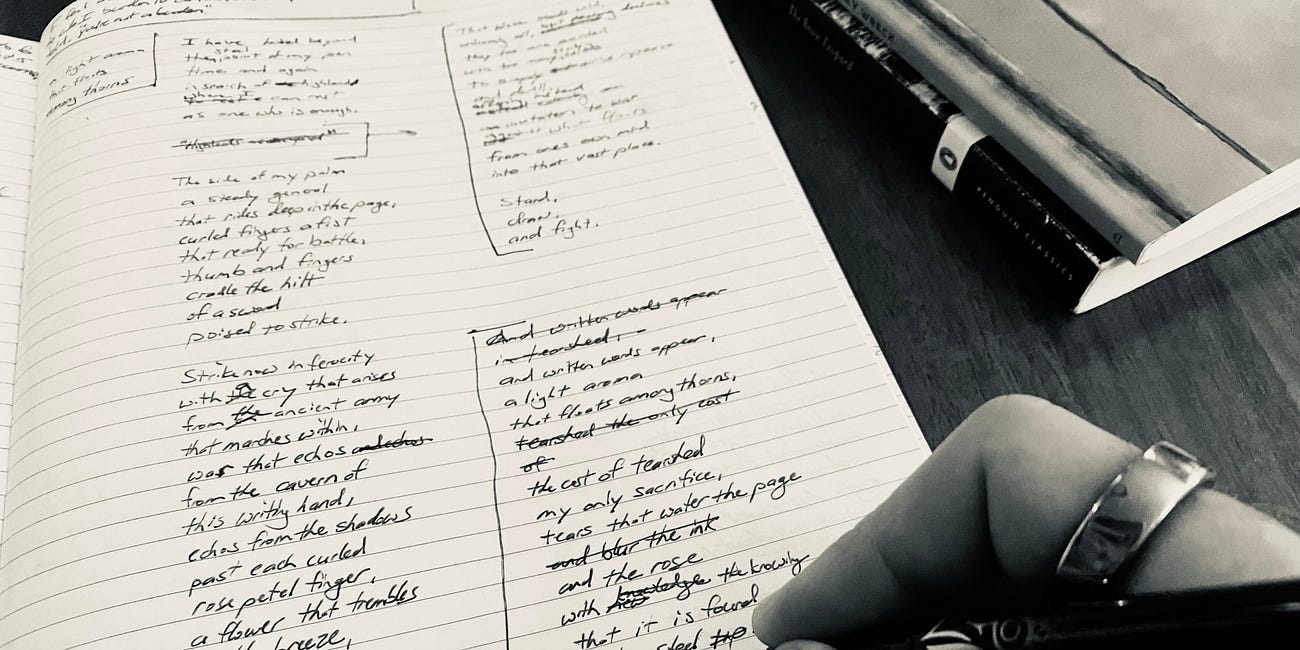
Reflection
Each of us has heard the adage “The pen is mightier than the sword”. When we observe the world we currently inhabit and the world for most of recorded history, in the most obvious way this idea is laughable. War, threats of war and implied war through military might are what dictate who holds power, whose ideologies spread, and who holds valuable resources. However, depending on the length of time in which you ponder outcomes, violent power is always overcome by the tenacity of soft power that emerges from those that hold a deep conviction.
Every ruling nation that had a time at the pinnacle has fallen, some quickly and some over a few hundred years. Contrast the time that empires have ruled with the longevity of ancient wisdom teaching. Writings of love, community, and unity have thrived through times of oppressive power and have not only lasted but expanded for millennia. Stories that continue to inspire and practices that change people many years after they first come to be linger and evolve. Over long arcs of time, we see that love and compassion are mightier than violence in their ability to sustain.
Further, various cultural and religious traditions contain larger truths that supersede any specific ruling institution and even their own tradition. These ideas typically began with one person’s intimate experience, which was then shared through story, and eventually written down, then was transposed and translated throughout many languages and cultures. This pattern has emerged in multiple places and multiple times, with common themes of unity, love, and community emerging repeatedly. It is interesting that the pattern begins with intense self-examination then moves to something larger that informs how communities and societies can operate in a way that benefits each member. To pick up another’s experience or story is inspiring for a time, but to skip the step of turning inward means one skips the step of experiencing and personalizing these truths. If we turn inward, we are tasked with the work of personal transformation and experiencing larger truths in our own lives, which can be a daunting task.
When it comes to the might that is needed to live a self-examined life, the pen strikes a more refined cut than any instrument that one would use to bully themselves. A pen brings our scattered thoughts onto a page where we can uncover where we deceive or lie to ourselves. A pen allows the wiser but often quieter parts of us to whisper and be heard. A pen allows us to thread together patterns that emerge that seem obvious when on a page but hide when they only live in our head.
There is a level of battling with oneself that comes with self-examination. To believe that one can look inward with an honest assessment and not become troubled seems rather unlikely as to look closely and to search carefully can only reveal the many parts that live inside each of us, some which we cherish and some that we would never brag about. Each of these parts meld into what we describe as our “self” but that self is simply what emerges into the conscious world. As we begin this work, we begin with broad statements and observations of who this self is, but as the work continues and we begin to know the parts, we may be driven to denial, or to run, or to spear, or if we can stay open to the discomfort, to eventually accept and work with them.
This is the work The rose war explores, not a dichotomy of pen and sword but an exploration of the experience of self-examination through pictures of the hand that can hold the pen and wield it as a sword and simultaneously contain the sensory beauty of a flower.
The poem
The story in this poem begins with the search for rest in a beautiful place, only to arrive in an idyllic setting and realize to one’s chagrin that the subject brought themself, in all their turmoil, along. Finding peace has little to do with our setting, but with our internal state. To find peace will take a reckoning with ourself.
I have looked beyond
the steel point
of my pen
time and again
in search of highland
where I can rest
as one who is enough.
The wise terrain
stands welcoming and wild
and declares
I too am painted
with too many striking colors
to arrive in peace and dwell,
an invitation to war against
what floats from my own mind
into this quiet place.
Stand,
draw,
and fight.
Preparation occurs in the next stanza. We hear of a leader, an officer, and an instrument that are ready as they lean on top of a blank page. Consider the felt experience of returning to yourself after some length of time to think and explore. Picking up a pen and wondering where to start the march holds the tension that one might feel before they begin a military campaign.
The side of my palm
a steady general
riding deep in the page,
curled hand a fist
that readies for battle,
thumb and fingers
cradle the hilt
of a sword
poised to strike.
As the war cry rings out, the setting of this particular battle becomes clearer. Pause and give yourself the experience. Pick up a pen and look into the dark cavern of your hand for the armies that will march. Write for 2 minutes and listen to the war cry that emerges from the battle in that cavern. Continue writing and watch your hand move, fingers transformed into a rose that as the pen furiously scribes, moves with a vibration that mimics a flower in a breeze.
Strike now with a cry
arising from
ancient armies
that march within,
war that echoes
from the cavern of
this writing hand,
echoes from the shadows
past each curled
rose petal finger,
a flower that trembles
in the breeze,
The final stanza is an experience not of bloodshed, but of an emergence and a giving. An aroma emerges representing something light that cannot be grasped (in this picture the dreamlike scent of a rose) and is spread with a breeze. Tears are “sacrificed”, but that giving that occurs in the difficulty of the struggle is the water that falls onto the hand and helps the metaphorical rose continue to grow.
and written word appears
a light aroma
that floats among thorns,
tearshed my only sacrifice,
tears that water the page
and the rose
with the knowing
that it is found in
the steel point
of my pen.
In closing
This poem is bookmarked with the lines “the steel point / of my pen.” This is not a definitive statement that you must do your self-examination through writing. There are many forms reflection can take, whether deep linear thinking, meditating on a question, or creating art. I suppose each form of self-examination is complimentary. To create is to participate in the emergence of the natural around us. To meditate is to experience who we are and who we are not. To think deeply is to build onto the deep thoughts that preceded each of us. But to write is to take all of these other forms and transcribe them into our consciousness, into language, into the way that we communicate with the world around us.
Pick up a pen. “It” is found there. What is it? For this poem, it is the highland inside of you. For you? It is what you search for.
May your hand tremble in the breeze…
Brian
If you missed the original “A Poem” post of The rose war, I hope you will read and enjoy! You can find it here.





"This is the work The rose war explores, not a dichotomy of pen and sword but an exploration of the experience of self-examination through pictures of the hand that can hold the pen and wield it as a sword and simultaneously contain the sensory beauty of a flower."
🤯🙏
I think you could have written just this and I would have sat here stunned and in awe.
Reflective excursion inward